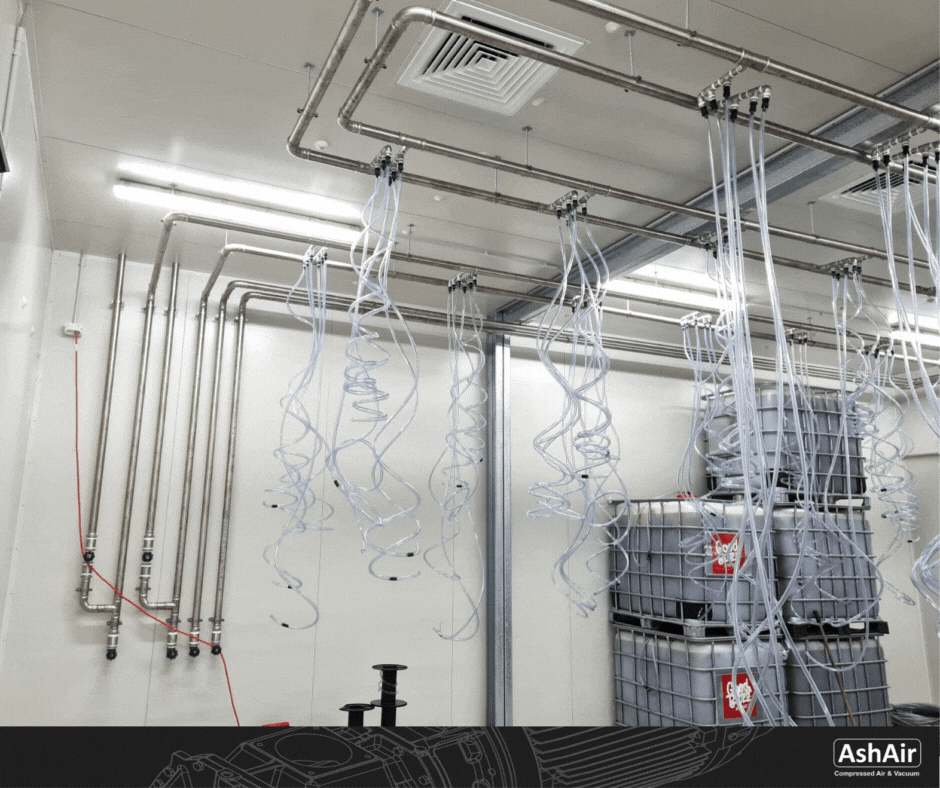Proportioning the Compressed Air Dryer
Trying to figure out which air dryer capacity is best for you? Here are some factors to consider. Read More…
The piping in your system can make or break the profitability of your business. Lost power, loss of pressure, wet air, rusted tools and leak protection are just a few things that you experience with inefficient piping.
.jpeg) What
causes a drop in pressure?
What
causes a drop in pressure?
Ensuring your air compressor piping is properly sized and laid out is just as important as the air compressor you use. When air flows through a pipe there will be a pressure drop as the result of resistance to the flow. Friction loss occurs through any pipe fittings, bends, valves, or components on the piping system. Pressure loss is also due to a change in elevation of the piping, usually vertical piping.
1. Pipe Sizing: Restricting the flow path means that piping joints with different diameters will result in pressure loss.
2. Bends in the Piping: Turbulent flows occur in bent sections, making it difficult for fluids to flow. When this happens, normal flow changes to turbulent flow and energy loss will occur. Remember energy loss leads to lowered pressure.
3. Installing an open/close valve: If ball valves and other valves are left fully opened, then pressure loss should not be a concern. However, with valves that change the flow path inside the valve, pressure loss will occur even if fully opened.
4. Install a flow meter: Flow meters restrict and quicken the flow path in order to provide stable vibrations. The flow path is restricted in order to generate enough thrust to spin the paddles when there is small flow. For these types of flow meters, pressure loss occurs easily.
S-Drop: A system curve often resembles the letter "S". Water flowing under the power of gravity curves through the piping. When water is flowing in the pipe friction loss occurs that reduces the pressure energy at all points along the pipe.
T-Drop: Exactly how it sounds, piping extends across and the air drops down in between making the shape of a "T". Disadvantages of the "T" drop is that the moisture flows down the air tunnel with the air.
AIRnet (available in both aluminum and stainless steel) offers moisture-eliminating drop fittings called Quick Drops. Quick Drops make “drop-tees” obsolete, removing the need for extra parts and pipe, while saving time and money. Quick Drops provide for a vertical AND horizontal option. AIRnet simplifies the addition of drops into the header loop by putting the hole-saw guide ON the Quick Drop. No drill jigs, bulky guides, or extra tools required. The hole for a Quick Drop is also on the side to ensure the air continues to stay dry as it enters your tools. A huge benefit is that a Quick Drop can also be added to existing systems to help maintain dry air.

Do you have an idea for our #expertcorner? Let
us know!
Ash Air has been around in New Zealand since 1979, and we’ve grown into a nationwide company with international support and a reputation for quality and reliability.We look after all things compressed air for your business!
Ash Air's range of Chicago Pneumatic, Alup, Pneumatech, and Quincy compressors are used extensively around the world in industries ranging from oil and gas to food, automotive and farming, and we bring you these world class compressors here in the land of the long white cloud.Our technicians are compressed air equipment experts and are dedicated to addressing customer needs. Supported by a 13 locations nationwide, Ash Air offers one of the widest selections of compressed air equipment and parts available today in New Zealand.
With Ash Air compressors, you can count on reliability and high performance for even the most demanding applications. We focus our efforts on the following:
Talk to the team today:
Proportioning the Compressed Air Dryer
Trying to figure out which air dryer capacity is best for you? Here are some factors to consider. Read More…
Maintenance budget: 8 factors to consider
Just like any other equipment, a compressed air installation also requires the necessary maintenance work during its entire lifespan. Even though maintenance costs are only about 5 to 10% of a machine's annual operating costs, failure to budget for maintenance can have potentially disastrous consequences. Read More…
The air dyer is one of the most ignored cooler in the system. A dirty condenser will cause water in the lines, or worse it will cause complete dryer failure. Read More…